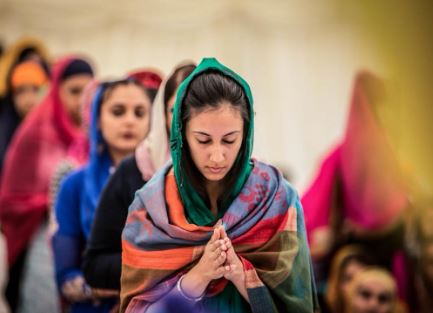About 500 years ago, the reality for countless women was living in a world where you are constantly told they were less valuable, capable, and worthy. For centuries, they were denied education, excluded from decision-making, and treated as property rather than people. This was when Guru Nanak Dev Ji challenged this deep-rooted inequality, not with weapons or power, but with the transformative force of truth and compassion.
“Why call her inferior, from whom kings are born?” Guru Nanak Dev Ji’s words shook the foundations of a patriarchal society. His teachings – and the vision of Sikhism as a whole uplifted women in revolutionary ways.
The Divine Light in All Beings
In Sikhism, the belief that every being carries the same divine light (jot) is central. It doesn’t matter who you are—man, woman, rich, poor, of any caste or color. Guru Nanak Dev Ji taught that we are all equal before Waheguru, the One Creator.
ਭੰਡਿ ਜੰਮੀਐ ਭੰਡਿ ਨਿੰਮੀਐ ਭੰਡਿ ਮੰਗਣੁ ਵੀਆਹੁ।
ਭੰਡਹੁ ਹੋਵੈ ਦੋਸਤੀ ਭੰਡਹੁ ਚਲੈ ਰਾਹੁ।
ਭੰਡੁ ਮੁਆ ਭੰਡੁ ਭਾਲੀਐ ਭੰਡਿ ਹੋਵੈ ਬੰਧਾਨੁ।
ਸੋ ਕਿਉ ਮੰਦਾ ਆਖੀਐ ਜਿਤੁ ਜੰਮਹਿ ਰਾਜਾਨ।
(From woman, man is born; within woman, man is conceived; to woman, he is engaged and married. Woman becomes his friend; through women, future generations come. When his woman dies, he seeks another woman; to the woman, he is bound. So why call her inferior, from whom kings are born?)
These words are more than just an acknowledgment of women’s importance. They declare their sacredness. Guru Nanak Dev Ji wasn’t merely advocating for women’s equality; he asked us to recognize their divinity.
A Faith That Elevates Women
Guru Nanak Dev Ji didn’t stop at words. He laid the foundation for a faith that practices equality in every sphere of life. The Guru Granth Sahib, Sikhism’s eternal scripture, acknowledges and celebrates women’s equality.
Spiritual liberation – the ultimate goal in Sikhism is equally accessible to women and men. Gurbani often uses feminine metaphors to describe the soul’s relationship with Waheguru. The soul, regardless of gender, is portrayed as a bride yearning for union with the Divine:
ਗੁਰਮੁਖਿ ਰਾਵੈ ਸੋਹਾਗਣੀ, ਮਨਮੁਖਿ ਭਰਮਿ ਭੁਲਾਇ।
ਬਿਨੁ ਨਾਵੈ ਧਨੁ ਰਲਿ ਗਇਆ, ਵੇਚੈ ਕਛੂ ਨ ਪਾਇ।
(The soul-bride who follows the Guru enjoys the Divine union, while the self-willed soul-bride is lost in delusion. Without the Name, her wealth is wasted, and she gains nothing.)
This imagery reinforces that women and men are equally capable of spiritual growth, wisdom, and enlightenment.
Actions Speak Louder: The Gurus and Women’s Leadership
The Sikh Gurus didn’t just preach equality; they lived it. They empowered women to lead, participate, and contribute meaningfully to society:
- Mata Khivi Ji played a crucial role in establishing Langar (the community kitchen), a practice that breaks down social hierarchies and treats everyone equally, regardless of gender or caste.
- Mai Bhago Ji emerged as a warrior and leader, leading Sikh soldiers into battle and becoming a symbol of strength and faith.
- Women were welcomed as equal participants in worship, education, and community life. They could lead prayers, perform kirtan (devotional singing), and engage in decision-making within the Sikh community.
At a time when most women in the world were denied fundamental rights, Sikhism envisioned a society where they were equal partners.
Breaking Chains: Social Reforms in Sikhism
The Sikh Gurus actively worked to dismantle oppressive practices that harmed women:
- Dowry and Bride-Burning: The Gurus condemned the dowry system and the barbaric practice of sati (forcing widows to self-immolate). They advocated for women’s right to live with dignity and independence.
- Widow Remarriage: Guru Amar Das Ji encouraged widow remarriage, breaking the stigma that widows were “cursed” and had no place in society.
- Education for All: Sikhism emphasizes the importance of education for both women and men, empowering women with knowledge and opportunities for growth.
Lessons for Today: Walking the Guru’s Path
Even today, many women face barriers, whether it’s unequal pay, domestic violence, or societal pressures. The teachings of Guru Nanak Dev Ji remind us that gender inequality is not just a social issue; it is a spiritual one. When we disrespect women, we dishonor the Divine light within them.
So, how can we honor the Gurus’ vision?
- Speak Out Against Injustice: Whether it’s dowry, discrimination, or domestic violence, stand up for what’s right.
- Celebrate Women’s Contributions: Acknowledge and uplift the achievements of women in your community, workplace, and home.
- Teach Equality to the Next Generation: Educate boys and girls about respect, compassion, and equality from an early age.
A Prayer for Equality
Let’s take a moment to reflect and pray:
ਹੇ ਵਾਹਿਗੁਰੂ, ਸਾਡੇ ਦਿਲਾਂ ਵਿੱਚ ਦਇਆ ਤੇ ਸਹਿਣਸ਼ੀਲਤਾ ਜਗਾਓ। ਸਾਨੂੰ ਸਮਰਥਾ ਦਿਓ ਕਿ ਅਸੀਂ ਔਰਤਾਂ ਦੀ ਮਰਿਆਦਾ ਅਤੇ ਅਧਿਕਾਰਾਂ ਦੀ ਰੱਖਿਆ ਕਰ ਸਕੀਏ। ਸਾਡੇ ਦਿਲਾਂ ਵਿੱਚ ਇਹ ਸਮਝ ਪ੍ਰਕਾਸ਼ਿਤ ਕਰੋ ਕਿ ਹਰ ਜੀਵ ਤੇਰਾ ਹੀ ਰੂਪ ਹੈ।
(O Waheguru, awaken compassion and patience within us. Grant us the strength to protect the dignity and rights of women. Illuminate our hearts with the understanding that every being expresses You.)
Honoring the Divine in Every Woman
Guru Nanak Dev Ji’s message is clear: the world cannot thrive when half its population is silenced or suppressed. Women are not just equal; they are sacred, powerful, and integral to the fabric of humanity. As we reflect on the Gurus’ teachings, let’s commit to creating a world where women are celebrated, respected, and empowered not just for their contributions as mothers, sisters, or daughters but simply because they are.
By walking the path of equality envisioned by Guru Nanak Dev Ji, we honor women and the Divine light that resides in all of us.


Leave a Reply